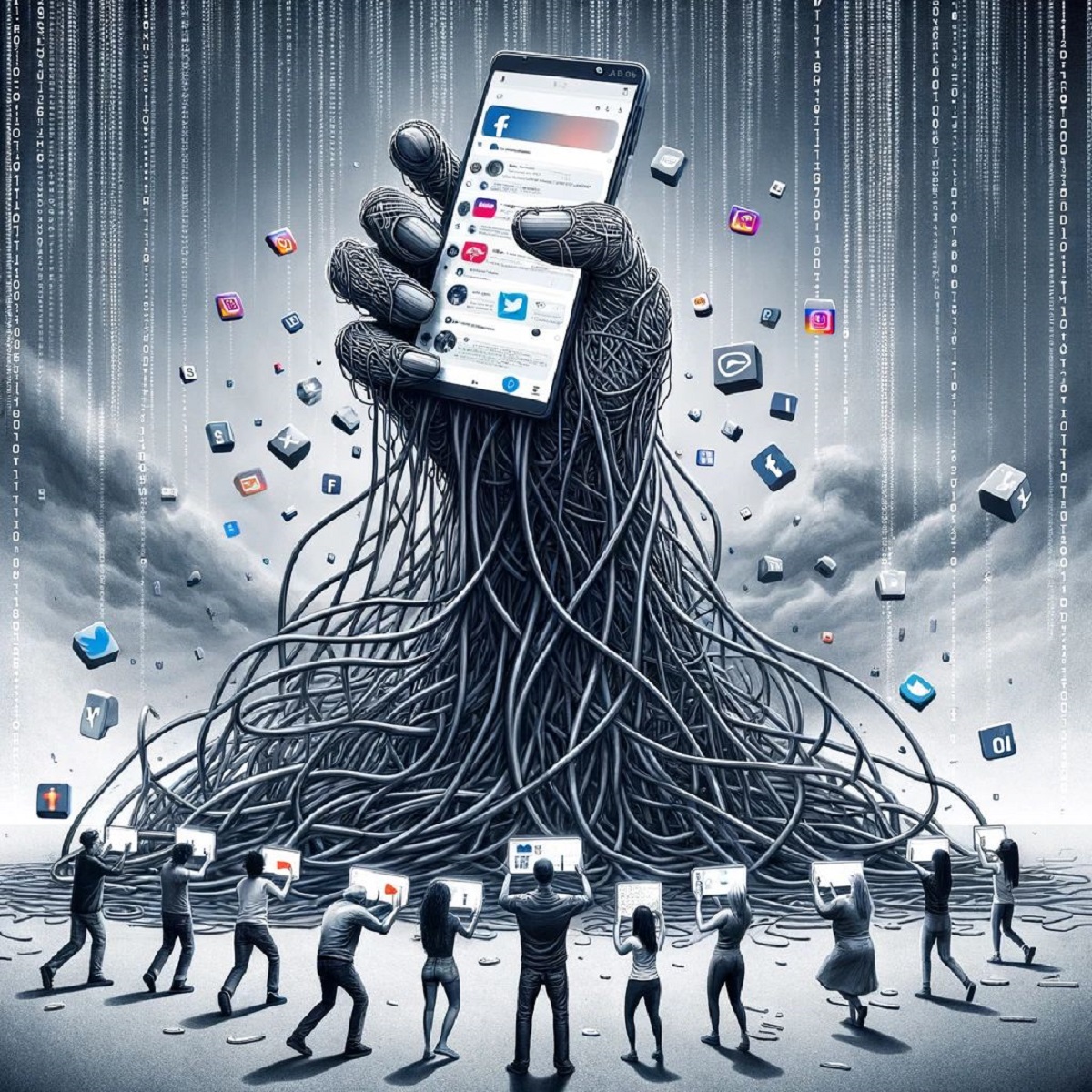
Is the Arabic X platform controlled by security? Privacy concerns and military spying are at stake.
There have been growing concerns that social media has been used widely by political groups to shape public opinion and transcend as the new “technological weapon” in the ongoing Middle East war. Both sides are not exactly being “angels” in their use of propaganda and spying on social media accounts. In Lebanon, activists interviewed by NOWLEBANON said investigators in the ISF Bureau of Information Intelligence had entire scripts of their WhatsApp messages when they summoned them for investigation. “They did not even bother to ask for our phones,” they quoted. Security agents in Lebanon use this kind of hacking for political purposes more than for criminal purposes, they intimidate political opponents by hacking their WhatsApp and use the info against them, the source said.
“Whether this technology is available to them legally or not legally, it is scary,” the source concluded. NOWLEBANON was not able to verify the accuracy of the quote.
Facts
A new investigation by +972 Magazine and Local Call reveals that the Israeli army has developed an artificial intelligence-based program known as “Lavender,” unveiled here for the first time. In a recent blog post, software engineer and activist Paul Biggar highlighted Lavender’s reliance on WhatsApp. He pointed out how membership in a WhatsApp group containing a suspected militant can influence Lavender’s identification process, highlighting the pivotal role messaging platforms play in supporting AI targeting systems like Lavender. According to six Israeli intelligence officers, who have all served in the army during the current war on the Gaza Strip and had first-hand involvement with the use of AI to generate targets for assassination, Lavender has played a central role in the unprecedented bombing of Palestinians, especially during the early stages of the war. In a related note, TIME magazine reported a Google document revealing the first known contract between the tech giant and the Israeli Security Ministry that will allow the latter greater access to the firm’s Cloud and AI services.
The document indicates that the Israeli Ministry of Security has a designated “landing zone” within Google Cloud. This secure access point provides the Ministry with the ability to store and process data, as well as access AI services offered by the firm. The Ministry requested consulting help from Google to broaden its access to Google Cloud, aiming to enable “multiple units” to utilize automation technologies. A draft contract dated March 27, 2024, indicates that Google billed the Israeli Ministry more than $1 million for this consulting service. The so-called Project Nimbus is a contentious $1.2 billion cloud computing and AI deal involving the Israeli government and two tech giants, Google and Amazon.
On the other side of the curtain, according to the Washington Institute, “Until Twitter’s moderation policies are strictly enforced and moderation loopholes addressed, coordinated efforts will continue to target independent anti-Hezbollah and anti-Hamas voices on Twitter’s X while effectively sharing their own messaging, thus ensuring that in the Middle East, Iran-backed actors maintain their grip on the site.”
The leader of Hezbollah said during a recent speech that a number of militia leaders were haunted through their internet connection. Worries have been raised that WhatsApp conversations are not entirely safe due to potential privacy and security vulnerabilities. End-to-end encryption protects messages from being intercepted during transmission, but it doesn’t guarantee absolute security, experts say.
Hacking instances have been recorded repeatedly in Lebanon. Cybersecurity breaches in Lebanon’s government entities have multiplied in the last couple of weeks, and more “hacking attacks” should be expected in the future due to the low level of protection of official websites.
Earlier, the Social Affairs Ministry website was hacked, following an attempted hacking of Lebanon’s Parliament website, and the hacking of Beirut International Airport’s internal systems earlier in January.
META policies are biased
WhatsApp users must share data with Facebook if they want to continue using the app, reports state. “As part of the Facebook family of companies, WhatsApp receives information from, and shares information with, this family of companies,” the new privacy policy states. Following the notification from WhatsApp, Tesla CEO Elon Musk tweeted, “Use Signal,” in reference to a competitor encrypted messaging app that has received better data privacy grades from tech experts.
Also, Meta’s Oversight Board issued a directive calling on the company to end its blanket ban on the Arabic word shaheed, which translates to martyr in English. The independent board said Meta had always interpreted the term when used to refer to designated individuals as a violation of its policies, however, the word shaheed has several other uses that are non-violating.
Helle Thorning-Schmidt, co-chair of the board, said: “This blunt method is doing more harm than good. It can even lead to those speaking about deceased loved ones having their content taken down in error,” she added. The ruling comes after years of criticism about how Meta handles content involving the Middle East.
A 2021 study commissioned by Meta itself found that the company’s approach had an “adverse human rights impact” on “the rights of Palestinian users to freedom of expression, freedom of assembly, political participation, and non-discrimination, and therefore on the ability of Palestinians to share information and insights about their experiences as they occurred.”
Privacy concerns
Social media algorithms used by social media platforms can create echo chambers, reinforcing existing beliefs and limiting exposure to diverse perspectives.
Groups use social media and other technologies to recruit and, at times, support operations, their primary focus is using more traditional media to gain support from Arab and Muslim populations and bolster morale within their organizations, with their constituents in the Palestinian territories and Lebanon comprising their most important audiences. Counterterrorism also shapes this focus: social media–run operations are highly vulnerable, and Israeli counterterrorism can exploit this to disrupt attacks.
Privacy concerns on social media platforms raise questions about the true extent of control users have over their personal information—a view not shared by telecom engineer Salloum Dahdah. “WhatsApp messages are entirely safe,” Dahdah told NOWLEBANON. However, he concedes that if META wants to decrypt and share the information on WhatsApp, they can do that technically. Encryption is applied to WhatsApp messages, but bugs can be put on phones to intercept communications, he said.
Social Media has been controlled by governments; we have seen testimonies from social media founders on the hill, the latest being accusations directed at the growing role of TIKTOK and its alleged data sharing with “unfriendly” regimes.
Social media can be a platform for misinformation, rumors, and fake news, impacting public discourse and decision-making.
Malicious actors can exploit weaknesses in the app or device to access chats or gather metadata. Backups stored in cloud services are not encrypted, exposing them to potential breaches. WhatsApp’s parent company, Meta Platforms, has faced criticism for data privacy issues in the past.
Users should be cautious about sharing sensitive information or engaging in sensitive conversations on WhatsApp in Lebanon, experts who asked for anonymity told NOWLEBANON. Phishing attacks, malware, and social engineering tactics are compromising WhatsApp security, they added. The app’s default settings may share data with third parties, raising concerns about user privacy. It is a fact that governments or law enforcement agencies may request access to WhatsApp data through legal channels.
Online usage stats
Data from GSMA Intelligence shows that there were 4.63 million cellular mobile connections in Lebanon at the start of 2024. There were 4.76 million internet users in Lebanon in January 2024, a research by Kepios said. Lebanon’s internet penetration rate stood at 90.1 percent of the total population at the start of 2024. Kepios analysis indicates that internet users in Lebanon decreased by 129 thousand (-2.6 percent) between January 2023 and January 2024.
For perspective, these user figures reveal that 525.5 thousand people in Lebanon did not use the internet at the start of 2024, suggesting that 9.9 percent of the population remained offline at the beginning of the year.
Data published by Ookla indicate that internet users in Lebanon could have expected the following internet connection speeds at the start of 2024: Median mobile internet connection speed via cellular networks: 31.06 Mbps. Median fixed internet connection speed: 9.39 Mbps. Ookla’s data reveals that the median mobile internet connection speed in Lebanon increased by 2.67 Mbps (+9.4 percent) in the twelve months to the start of 2024. Meanwhile, Ookla’s data shows that fixed internet connection speeds in Lebanon increased by 2.14 Mbps (+29.5 percent) during the same period. DataReportal’s figures show that there were 4.52 million active social media user identities in Lebanon in January 2024. Data published in Meta’s advertising resources indicates that Facebook had 3.15 million users in Lebanon in early 2024. Facebook Messenger reached 1.85 million users in Lebanon in early 2024.
Data published in ByteDance’s own ad planning tools show that TikTok’s potential ad reach in Lebanon increased by 1.1 million (+41.3 percent) between the start of 2023 and early 2024.
Where do we go from here
In 2022/2023, as part of the Tensions Monitoring System, the UNDP commissioned a study on whether and how people use WhatsApp to create or contribute to incidents and tensions in Lebanon. The report was commissioned based on the noticeable shift in nature of information circulated on social media, coupled with an evident uptick in tensions and incidents. Using a mixed-methods methodology, the report provides few overarching insights into how WhatsApp is being used in Lebanon. The study concluded that WhatsApp is indeed a pivotal platform in Lebanon for everybody, used to obtain and share information and seen as a tool of free, convenient, rapid, and flexible communication. The perception of WhatsApp as a trustworthy platform likely contributes to its popularity and the ease with which information is shared among its users. This means that WhatsApp has great potential to influence both negative and positive sentiments. The unique nature of WhatsApp contributes to creating an environment where misinformation and disinformation can proliferate across various segments of society. While it plays a critical role in ensuring users communicate with one another and be adequately informed of current events, it may also impact tensions across Lebanon in a variety of ways.
Last year hundreds of Lebanese reported that their WhatsApp accounts had been banned, without any prior notice from the application company.
An expert in the mechanisms of social media applications work says that since the start of the existing partnership between the Facebook and WhatsApp applications, and the entry of the latter into the “Meta” system. The percentage of numbers that are blocked without prior warning or due to a change in the activity of the number in sending news or groups has increased.
One of the reasons for the blocking of the number is the use of an unofficial application (for example, the WhatsApp Plus application, which allows manipulating some of the application’s privacy). The expert warns of a new working mechanism that WhatsApp may have entered into service, and what applies to Facebook may have started on WhatsApp specifically, which means resistance in Lebanon and hostility with the Israeli enemy.
“Prepare for the worst,” with this phrase, the expert concludes with the working mechanisms of the WhatsApp application.
He adds that with the start of data analysis, it means the start of analyzing profile pictures or sent photos. I mean, everyone who sends or puts a picture that bans the Facebook account (pictures of Sayyed Nasrallah, for example), is soon exposed to blocking on WhatsApp.
And he says that we must not lose sight of the fact that WhatsApp is, after all, an American application, and what is imposed by the policy of the American and Israeli government, including what it calls terrorism or a threat to peace, applies to it.
Maan Barazy is an economist and founder and president of the National Council of Entrepreneurship and Innovation. He tweets @maanbarazy.
The views in this story reflect those of the author alone and do not necessarily reflect the beliefs of NOW.








